There are many career pathways to success.

Our job as career coaches and practitioners is to help our students and clients discover a career by exploring career pathways that match their strengths and interests. Then to explore all the career pathways on how to get there, whether it is an apprenticeship, bachelors degree, trade school, or certificate.
All too often, I hear people say they will go to college and figure it out there. That is a very expensive and time-consuming way to do career exploration. I do get the sense that the “college for all” mentality is slowing down, but we still have a long way to go. The message that everyone should go to college to be successful has hurt our economy a couple different ways.
- Many people attended college who should not have been there and incurred lots of debt that will need to be paid back.
- Those same people could have been working during that time and making money.
- Many of those people would have been happier in trades and technical positions which are in need of people.
One problem, in my opinion, is that we have too many colleges in our country fighting over the same 18-year-olds. The college’s motivation is to fill seats at their college, not to help these people discover their best career pathways. We have begun to see higher education institutions closing down and I think we will see more.
I was thrilled that President Obama chose two-year colleges to highlight in his 8 years in office. Finally, we were placing emphasis on alternate career pathways to success besides four-year colleges. Community colleges play a vital role in training people for a variety of trades, technical, and health professions in short-term educational – career pathways. All while still allowing those students who want to go on to a bachelor’s degree another path to get there. i.e. Earn 60 credits at a community college, save money, explore, and then transfer to a bachelor’s degree.
Exploring career pathways need to start much earlier in schools and we need to ensure that we are honoring all jobs. Another issue is that school counselors are dealing with so many issues in schools these days that career often takes a backseat. Even their name has changed from ‘guidance counselor’ who provided guidance, to school counselor, which is much more multi-faceted. Having been a school counselor for a decade, I know all too well the pressures they face.

Regardless of the pressure to serve so many counseling needs in the schools, we MUST do more in our schools to introduce students to career choices and to make sure we are respecting all career pathways, including trades, technical, construction, and others. Including the conversation of apprenticeships, short-term training certificates, associate degrees, as well as bachelor degree options.
I recently attended a Chamber of Commerce meeting where we had a large construction firm, Sheridan Corporation, talk about their needs. There is such a shortage of workers in the construction field. But what amazing opportunities exist too! They struggle with the stigma that all construction jobs are dirty, there is a lot of travel to job sites, and it is a dead-end job. Starting out in the construction field the first two are often correct, but certainly not the dead-end job stigma.
Sheridan Corporation is providing on the job training, paying for training and education, providing transportable credentials, encouraging their employees to look for internal opportunities, providing mentors, and training their supervisors to provide more frequent feedback and encouragement to their employees. There will always be a need for entry-level construction/trades people, and now there are more opportunities than ever to grow in a company.
With technology integrated into all aspects of the construction industry from using GPS, to having a complete set of plans available on an I-Pad on site, to heavy equipment that tells the operator, “this is too heavy to lift”, the opportunities are many.
So what can we do as career providers?
- Focus on the individual’s strengths, values, passions, and interests and listen to what they are really communicating. (Not just what they are saying).
- Honor all jobs and all career pathways.
- Check and confront your biases and your clients/students biases.
- Explore all career pathways. There are many ways to getting to an end.
What do you see as ways to increase awareness and expand the number of people going into the trades, technical, and industrial industries and promoting the career pathways to them?
Read More Of My Blogs on the future of work.
Also, you may want to check out my book review on Shop Class As SoulCraft by Matthew Crawford.
Jim Peacock is the Principal at Peak-Careers Consulting and writes a weekly email for career practitioners. Peak-Careers offers discussion-based online seminars for career practitioners focused on meeting continuing education needs for CCSP, GCDF and BCC certified professionals as well as workshops for career practitioners and individual career coaching.
He is the author of A Field Guide for Career Practitioners: Helping Your Clients Create Their Next Move and The Adventure of Finding Me in New Zealand. He is also the recipient of the 2020 Kenneth C. Hoyt Award from the National Career Development Association and the Mid-Atlantic Career Counseling Association’s Professional Contribution’s Award in 2020.
Sign up to receive my TOP 10 TIPS WHEN WORKING WITH AN UNDECIDED PERSON. You will also receive the career practitioner’s weekly email on a variety of career topics, industry news, interesting events, and more. (Sign up)



Jim, very well stated. I agree that college is not for all and is too expensive. However, the fact remains that for many jobs a four-year education is required. You and I know that job seekers are having a hard time landing jobs because they don’t have a degree, whether it’s their first job at an early age or a job in mid-life, which for which they’re certainly qualified. For the second scenario, it’s a crime employers are committing, as they are denying people positions simply because they don’t have the piece of paper.
Sending kids to college for the experience is bunk. It’s an expensive bill to pay so they can have fun. I think the best plan–and I wish I had followed it–is to send our kids to a community college followed by two years to fulfill their four-year degree. It’s less expensive and let’s them determine if they need the final two years.
Thanks Bob for your thoughts. The real question is “do your kids need a college degree?” Parents need to consider, “would one of my children prefer long-distance truck driving? or being a mechanic? or a plumber? or using their math skills in heating, ventilation, air conditioning?
If someone wants a college degree for whatever reason, then YES, consider the community college.
The bigger question for me is, what are the persons “gifts” and what pathway helps them reach it?
AND we need to introduce trades options in schools and to really “value” those options.
As a career counselor at a community college, I say there’s a lot of wisdom in your words! Thanks for a great article, Jim.
Thank you Mary. For me it is all about respecting individuals and their gifts, while honoring all jobs in our economy.
I’ve be lookup Up career paths on websites like ONet and the Occupational Handbook. I personally find those sites outdated. What would you suggest I use? Would like to find one resource that has it all. Any suggestions Jim?
ONet and Occupational Outlook Handbook are great sites for learning about occupations. I love ONET to help build resumes and LinkedIn profiles, and I love both for the related occupations function. Neither is outdated as they are updated regularly by the Dept of Labor.
You say “find one resource that has it all”. I’m not sure what “it all” is.
If you are looking for something that has assessments, occupational information, and educational information for pathways, you would need to purchase a computer management system like Choices, or Focus 2, or Naviance.
Note: they all pull occupational information from either ONET or Occupational Outlook Handbook.